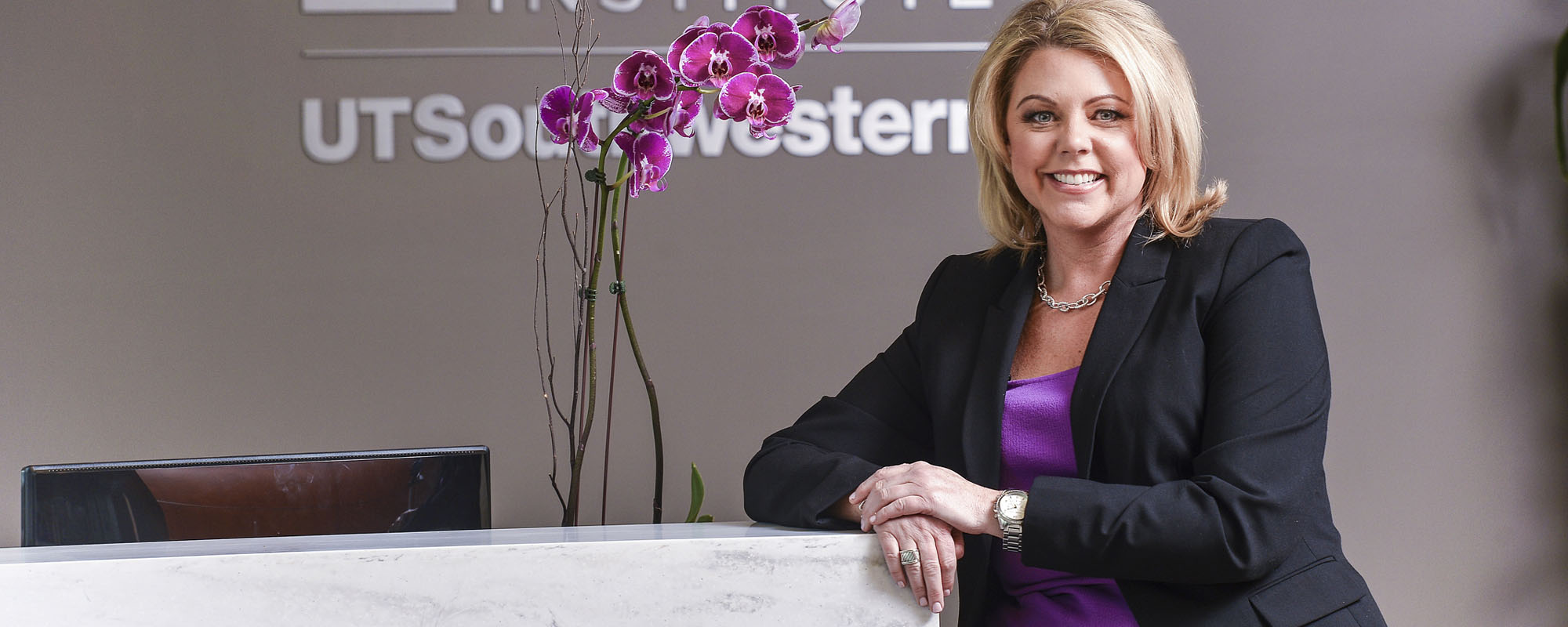As quickly as the elevator’s delicate ping caught her attention, Lori Drew ’95 paused her tour of the Moncrief Cancer Institute to greet the older man as he emerged. Her reaction was swift, her movements fluid; it was easy to see the gesture was one she had performed dozens of times before.
Clearly on a mission, the man was determined to meet “the person who runs this place,” he told her. Unsure of what to make of his visit, Drew continued to chat until a broader smile spread across her face. He urgently needed to meet the director, he explained, to say thank you for all of the amazing things the institute is doing to support cancer patients and their families.
Drew understood, she assured him. The man’s enthusiasm echoed her own and is one of many reasons she has worked at Moncrief for the past 15 years.
“We have the same mission now as we did in 1958 — to help people, regardless of their ability to pay,” Drew said. “This organization is a gift to the community. We are saving lives, and I get to see it every day. I couldn’t ask for anything more rewarding. I tell people all the time this is my dream job.”
“I was obsessed”
Drew, a Fort Worth native, has been enamored with the rush of the emergency room and the thrill of saving lives since before she can remember.
“Ever since I was a small child, I was obsessed,” she said. “My family would drive by a hospital or a medical equipment store, and I would want to stop and explore. Even growing up, I would ask my dad if we could go to the emergency room and watch doctors and nurses bring patients in on gurneys.”
The lush piney woods of East Texas and smaller, more personal class sizes attracted Drew to study at SFA after her graduation from Paschal High School. While pursuing a bachelor’s degree in biology, Drew worked in SFA’s Department of Advancement as an assistant and in the Department of Admissions as a peer counselor for recruitment and retention. She also was a notetaker for students with disabilities.
“I was a shy person and somewhat of an introvert, and those positions helped get me out of my comfort zone and prepared me for the real world,” Drew said. “The campus jobs gave me firsthand experience of how to deal effectively with the public. The positions also gave me the opportunity to make a difference and impact someone’s life for the better. My years spent at SFA were the best of my life.”
The personal and professional skills Drew learned in each of her roles at SFA — be it as a student, employee or member of the Delta Delta Delta sorority — translated to the professional world more than she could have imagined.
“My role at SFA would hopefully improve the students' quality of life in some form or fashion,” Drew said. “Ironically, my role at Moncrief is very similar, focusing on saving lives by providing cancer prevention for the medically underserved and to improve the overall quality of life for cancer patients and survivors.”
“The emotional impact”
Moncrief Cancer Institute has been a pioneer in cancer treatment and care in Fort Worth since the 1950s when Texas oilman William A. Moncrief and his wife, Elizabeth, partnered with Dr. Thomas B. Bond, a Fort Worth radiologist who dreamed of creating a center that would offer what was then the newest technology for treating cancer with radiation therapy.
Cancer treatment was a topic near the Moncriefs’ hearts as their granddaughter, Monty Francine, had been diagnosed with leukemia. She died when she was 8 years old. Understanding the emotional impact cancer can have on patients and families, the Moncrief family has donated millions during the past several decades, most recently to construct a new cancer treatment center in the area.
Now, through an affiliation with UT Southwestern Medical Center’s Harold C. Simmons Comprehensive Cancer Center and a mobile support clinic, the institute is able to bring services to residents of more than 30 Texas counties and continues to grow.
“The year I began working here, Moncrief was a radiation treatment center,” said Drew, who currently serves as the institute’s director of external relations. “We were acclaimed as a role model for community radiation centers nationwide, treated all patients regardless of their ability to pay, and served as a training facility for radiation therapists. But after almost 50 years, in 2006, we changed our direction from radiation treatment to a greater emphasis on cancer screenings and cancer survivor support services.
“We built a new 60,000-square-foot center in the heart of the Fort Worth medical district, complete with research, educational, nutritional, exercise and survivorship facilities. The new facility allowed us to expand our breast, cervical and colon cancer screening programs, among many other patient services.”
Of equal importance to cancer prevention is the institute’s insistence on creating a cheerful atmosphere. Elizabeth Moncrief first championed the idea in 1958 when she renovated the center to add brighter, more welcoming colors and placed flower bouquets in many rooms.
The results were palpable, even to Bond, the founding partner, who said, “You have no idea the emotional impact of a bowl of flowers.”
Drew continues to oversee a breast and cervical cancer screening program and is responsible for community outreach, physician relations, marketing, advertising and communications. But job descriptions aside, her passion for the institute continues to flourish in every small interaction and every positive impact made among its patients.



